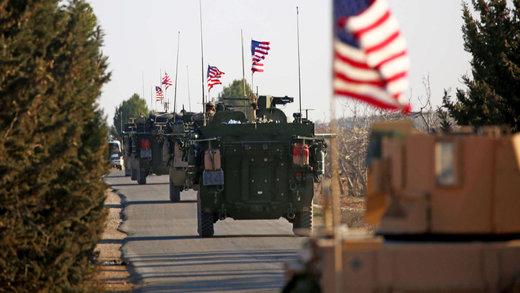In recent weeks, three noteworthy events have occurred in this regard:
First, holding a joint meeting between representatives of the US Central Intelligence Agency and elements of the ” Shammar” tribe at the Remilan base located in Al-Hasakah province. The reconstruction of the body of the group known as the “Syrian Democratic Forces” (SDF) and the formation of the “Island Military Council” consisting of armed militias in the border strip of Turkey were two important agendas of this meeting.
Second, holding a joint meeting with the presence of the US Deputy Assistant Secretary of State, the special envoys of Germany, France and the UK, and “Hadi Al Bahra”, the head of the Syrian opposition delegation in Geneva. In this meeting, it was emphasized that any movement in the Syrian political case must be in accordance with Resolution 2254, which was issued by the Security Council in December 2015, and emphasizes the ceasefire and political solution to the Syrian crisis, as well as the formation of a national unity government.
And finally, Nicholas Grainger, the representative of the US Department of State for Syrian Affairs, traveled to the north of this country and met and talked with the representatives of the “Autonomous Administration” and the “Kurdish National Council” as well as prominent elements and sheikhs of Syrian tribes.
There are two important points regarding the recent actions of the US in Syria and its results:
The first point: An important part of the aforementioned movements is followed by focusing on the Syrian tribes and nomads in northern Syria. Some tribes that have been living in these areas and sometimes extend to neighboring countries, played a prominent role in the escalation of the crisis in the country in the past years when Syria was engaged in the fight against Daesh. ” Shammar tribe” which is scattered in the four countries of Iraq, Syria, Jordan and Saudi Arabia, is one of the important and prominent tribes in advancing the new movements of the US in Syria.
This issue shows that the US is looking to create a “joint project” with the participation of Syrian tribes in the northeast of this country. Although the White House has not yet reached a specific formula in this regard, it seems that, as mentioned in the first paragraph, it seeks to form a “nomadic army” with the aim of political, security, economic, military, etc. exploitation of the developments in Syria.
The Nomadic Army or the Island Military Council is a part of the US “grand project” to create a “unified political organization” focusing on a 150 km long area from “Tel Kojar” to the suburbs of “Alhol” in Hasakah. After the destruction of Daesh in 2017, the US lost its biggest “leverage” and “playing card” in Syria. Therefore, to advance its goals, the US sought to replace the Kurds.
The White House’s support for the Kurds is actually a “cover” for maintaining the long-term US presence and influence in Syria, as well as the leverage against Bashar al-Assad’s government, and looting the country’s oil resources.
The second point: the coincidence of America’s movements in northern Syria with regional efforts to resume bilateral relations between Damascus and Ankara, the expansion of Arab countries’ relations with Syria, which is interpreted as the return of this country to the Arab world, as well as the rapid transition of Syria from the final stages of the security crisis, show that an independent, powerful, unified and stable Syria is not desirable for the US.
Washington is looking for an “insecure, fragmented and unstable Syria”. Therefore, it is trying to bring the group called “Raqqa Revolutionary Army” under the leadership of “Ahmad Alloush” nicknamed “Abu Eisi” back to the scene in the near future.
In addition to these and as another effective factor in the increase of the US field and political movements in Syria, it should also be referred to the opening of the Russian air base at the “Al-Jarrah” military airport in the north of Aleppo. Because this action has worried the Americans. Al-Jarrah Airport, which was in the hands of terrorists and opponents for a while during the war with Daesh, is considered the connecting link between east and west of Aleppo, so it has strategic importance in the internal developments of Syria.
The opening of this airbase shows that, contrary to some views that believe that the war in Ukraine has reduced Russia’s field and political focus on Syria, Moscow is still strengthening its military role in Syria.
Therefore, it is clear that there is an “inverse proportion” between US interests and the Syrian crisis. In the sense that by “strengthening” stability and security in Syria, America’s interests in this country will be “weakened” and conversely, maintaining or expanding the security crisis and instability in Syria and the regional and international isolation of this country will ensure the desired provision of America’s national interests. The fact that the field, political, diplomatic and security developments in Syria have been improving more intensively in recent months is not at all “pleasant” for the White House.
The US does not want to lose its presence and influence in Syria. Ensuring America’s political, military and security position in Syria is currently at the top of the US plans in relation to Syria. As the Syrian crisis approaches its final stages, the US is designing a new scenario to intensify the crisis and weaken the central government in Syria. A program whose main goal is to block the progress of crisis reduction programs in Syria and prevent the realization of regional arrangements with the aim of restoring Syria’s foreign relations. And this is while Syria has practically become a “failed project” for the US.










0 Comments